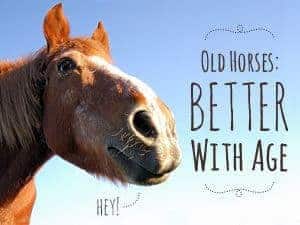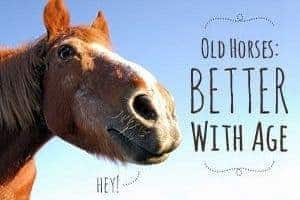Any Questions?
- Topics: Old Horses: Better With Age
Someone, who I regrettably wasn’t able to pinpoint, once said, “The stupidest question is the question that has not been asked.” Although I feel like select questions I pose on a variety of topics fall into the “stupid” category (An actual example, as recalled by my parents: Do you think we’ll see the Loch Ness Monster when we’re in Ireland?), the truth is that if you don’t know something, asking is the only way you’ll learn.
This is something I’ve learned well throughout my years caring for senior horses. Some of the questions I’ve asked my veterinarians, trainers, and trusted friends were prequeled with “OK, this might sound dumb, but…” while others have been more complicated:
“Will this treatment work?” Of course, we all know that veterinarian’s can rarely ever say for certain if a specific therapeutic modality will effectively treat a certain condition. But that doesn’t stop owners or managers–myself included–from asking. In this scenario, I asked this of a veterinarian who’d just prescribed an equine protozoal myeloencephalitis treatment for an affected Thoroughbred in his mid-20s. He was a farm favorite and everyone was devastated by the diagnosis. Of course, our veterinarians told us there was no guarantee. Unfortunately, this horse’s disease proved too severe, and he was euthanized as his quality of life deteriorated.
“How can we keep this from happening again?” After dealing with a series of unrelated chokes at the same farm, my coworkers and I asked our veterinarian what, if anything, we were doing wrong, and what we could do to prevent chokes in the future. She told us that, no, we weren’t doing anything wrong. All our horses had 24/7 access to water, ate good-quality hay, and consumed either a pelleted performance horse concentrate or a senior feed, depending on their specific needs. The root cause of our problems? The average age of our herd. Because the majority of our horses were seniors, some with additional health problems, we were already at risk for dealing with more chokes, she told us. She recommended that we continue our regular dental check-ups, consider making senior soup for horses with known dental problems, and placing some large smooth rocks in grain bins for notoriously fast eaters. Once our supervisor implemented the latter two protocol, we did not have another episode of choke while I worked at that farm
Create a free account with TheHorse.com to view this content.
TheHorse.com is home to thousands of free articles about horse health care. In order to access some of our exclusive free content, you must be signed into TheHorse.com.
Start your free account today!
Already have an account?
and continue reading.

Written by:
Erica Larson
Related Articles
Stay on top of the most recent Horse Health news with










